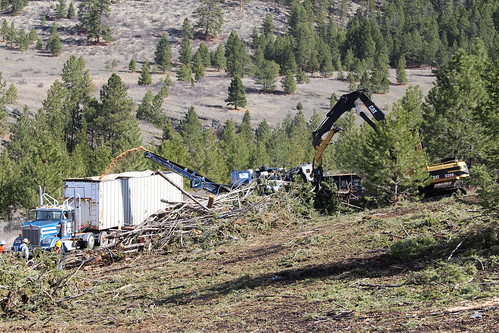
USDA celebrates National Native American Heritage Month in November with a blog series focused on USDA’s support of Tribal Nations and highlighting a number of our efforts throughout Indian Country and Alaska. Follow along on the USDA blog.
Alaska Airlines will conduct a demonstration flight in 2016 using 1,000 gallons of jet fuel made from forest scraps.
The aviation biofuel was derived from twigs and small branches that would otherwise have been burned in slash piles after timber harvest. These forest residuals were provided by the Confederated Salish and Kootenai Tribes (CSKT) and the Muckleshoot Indian Tribe via the Northwest Advanced Renewables Alliance Tribal Partnership Program (NARA TPP). TPP and other NARA partnerships are made possible by a $39.6 million grant from the U.S. Department of Agriculture’s National Institute of Food and Agriculture (NIFA).
CSKT and Muckleshoot are among many groups of Native American forest landowners in the Pacific Northwest. But with low college graduation rates and a large percentage of the indigenous workforce soon to retire, tribes are in danger of losing the expertise required for effective land management.
Native Americans are physically and spiritually tied to the lands in everything they do. They have a holistic land management approach that serves both the present and future, making use of whatever they take from the lands. A major driver of tribal participation in TPP has been the opportunity to convert forest residuals into a useful product that would not further contribute to smoke and pollution. The tribes have been involved at every step of the way in generating the 1,000 gallons of biofuel for the demonstration flight, with TPP thoroughly assessing economic opportunities for the tribally-sourced woody biomass and developing educational opportunities for Native American students.
TPP engages students from tribal colleges in bioenergy research, providing them with relevant land management skills that they can apply on their home reservations. The program prepares students for graduate school, effectively bridging the gap between tribal colleges – the majority of which grant 2-year degrees – and mainstream universities.
TPP has also taught non-Native Americans about the important role of tribal communities. “I realize now that it is critical to evaluate the impacts of our policy decisions by looking at where and how they intersect with our tribal communities,” says Katie Moore-Drougas, a TPP student who is pursuing a master’s degree in public administration at the University of Washington. “To create a more sustainable future we must take greater value in the knowledge that our tribes can provide.”
NIFA invests in and advances agricultural research, education, and extension and seeks to make transformative discoveries that solve societal challenges. These solutions result from partnerships such as TPP that bring together a diversity of cultural perspectives. “Our region’s tribes are valued members of the forest landowning community,” says Dr. Mike Wolcott, NARA project co-director. “Their participation is vital to our work with the supply chain, and we highly value their participation.”



